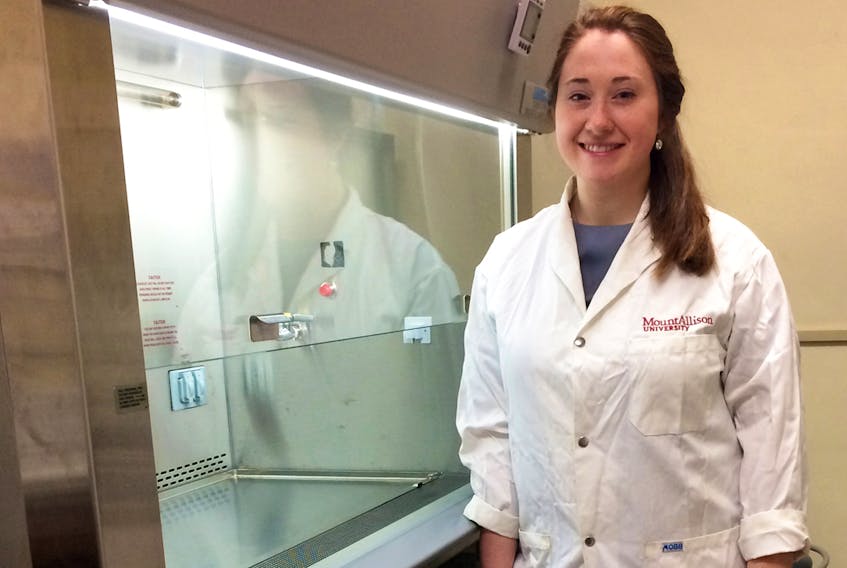SACKVILLE, N.B. – One of the challenges in treating Lyme disease, whether for humans, pets, or agricultural animals, is diagnosing it in the first place, as existing tests have varying levels of accuracy.
Fourth-year Mount Allison biology student Julia Bland is hoping her summer and honours research will help change that, at least for a few species.
“There have been some tests that have been optimized already for species, one for dogs, for example, and it works really well,” says Bland, who is from Avonport, N.S. “Creating a similar test for other species is my end goal. I’m not sure if I will get there, but the holy grail of this project is to get to that point.”
Bland is studying the enzyme-linked immunosorbent assay (ELISA) test, one of the most common tests used to detect Lyme disease.
“The ELISA is looking for an immune response, for the detection of antibodies in the blood of animals,” she says. “I am taking an established protocol for the canine test and optimizing it for the different species that I am working with, trying to make it more accurate for different species, instead of using one test for all species. Different animals have quite different immune systems.”
The research is supported by a grant from the Canadian Lyme Disease Foundation.
“I was really, really fortunate to get the independent summer research grant. I couldn’t do this work without it,” Bland says. “And it makes a big difference to my honours thesis to have the time to do really great science. The summer grant just allows a lot of flexibility to take your time and make sure you do it right.”
Bland is carrying out her research under the supervision of Dr. Vett Lloyd, a Mount Allison biology professor who is a noted expert in tick and Lyme research.
“One of the things that really impresses me is how proactive the veterinary community is in dealing with Lyme disease, and, as a result, how good the testing is for dogs,” Lloyd says. “When I was worried that my dog was ill with Lyme disease, I took her to the vet hospital and within 30 minutes the vet had taken a blood sample, tested it, and prescribed antibiotics to treat it. In the ideal world, human testing could be as fast. Working with Julia, a future veterinarian, is wonderful and we are starting on the problem of designing better Lyme disease tests by adapting the canine test to horses.”
Bland is planning to pursue a career in veterinary medicine after Mount Allison and has already been accepted at the Atlantic Veterinary College in P.E.I.
“This research seems like a match made in heaven. It’s very applicable to what I want to do in the future,” she says. “I volunteered for a number of years back home for a vet clinic and we talked about Lyme disease a lot and the prevalence of it and that got my interest piqued. Coming to Mount A and taking a class with Dr. Lloyd sparked my interest even more. I’ve been really fortunate to work with her; she is a really great supervisor.”
Bland says her best advice to new students is not to be afraid to step out of your comfort zone and talk to people, especially professors.
“Especially when you get into upper-year courses, they will know your first and last name, what you’re interested in, where you are from – even in first year, make that connection right away. You never know what opportunities may come your way,” she says. “I feel like we say it so much, it’s become a cliché, but it’s not – at Mount A people really are as easy to get along with and talk with as we say they are.”









